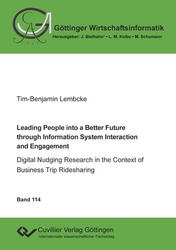| Fachbereiche | |
|---|---|
| Buchreihen (96) |
1381
|
| Nachhaltigkeit |
3
|
| Gesundheitswesen |
1
|
| Geisteswissenschaften |
2370
|
| Medienwissenschaften | 16 |
| Theologie | 57 |
| Philosophie | 102 |
| Rechtswissenschaft | 424 |
| Wirtschaftswissenschaften | 851 |
| Sozialwissenschaften | 418 |
| Sportwissenschaften | 48 |
| Psychologie | 233 |
| Pädagogik | 190 |
| Geschichtswissenschaften | 183 |
| Kunstwissenschaften | 111 |
| Kulturwissenschaften | 166 |
| Literaturwissenschaften | 117 |
| Sprachwissenschaften | 88 |
| Naturwissenschaften |
5408
|
| Ingenieurwissenschaften |
1795
|
| Allgemein |
98
|
|
Leitlinien Unfallchirurgie
5. Auflage bestellen |
|
Erweiterte Suche
Leading People into a Better Future through Information System Interaction and Engagement (Band 114)
Digital Nudging Research in the Context of Business Trip Ridesharing
Tim-Benjamin Lembcke (Autor)Vorschau
Leseprobe, PDF (240 KB)
Inhaltsverzeichnis, PDF (130 KB)
Climate change has become one of the most significant challenges humanity faces. As
greenhouse gas emissions continue to rise, not only will natural disasters strike considerably
more frequently and severely, but whole swaths of land will become uninhabitable
and infertile as farmland. It is apparent that long-term approaches like reaching net-zero
with new technologies are important, but so are short-term measures to avoid tipping
points and passing points of no return. The transport sector accounts for nearly a quarter
(23%) of energy related-emissions, and 40–60% of these transport-related emissions
stem from commuting and business traveling. One short-term approach to lower transport
emissions is ridesharing: When two or more commuters team up, significant emissions
can be saved. As a result, business trip ridesharing (BTRS), the sharing of individual
vehicles for commuting and business trips among employees, has gained increased attention
from organizations and academia alike. BTRS shares similar adoption challenges
like ridesharing and shared-mobility overall: From individuals’ prevalence to solving the
matching and allocation problem of shared resources. This thesis investigates the role that Green Information Systems (Green IS) can play to
support BTRS adoption.
| ISBN-13 (Printausgabe) | 9783736976023 |
| Buchendformat | A5 |
| Sprache | Englisch |
| Seitenanzahl | 276 |
| Umschlagkaschierung | glänzend |
| Auflage | 1. |
| Buchreihe | Göttinger Wirtschaftsinformatik |
| Band | 114 |
| Erscheinungsort | Göttingen |
| Promotionsort | Göttingen |
| Erscheinungsdatum | 23.03.2022 |
| Allgemeine Einordnung | Dissertation |
| Fachbereiche |
Philosophie
Wirtschaftswissenschaften Betriebswirtschaftslehre Volkswirtschaftslehre Informatik |
| Schlagwörter | Mobility, Smart Mobility, Information Systems, Human-Computer Interaction, User Centered Design, Engagement, Sustainability, Digital Nudging, Ridesharing, Carpooling, Shared Mobility, Business Trips, Business Trip Ridesharing, Taxonomy, Business Models, Sharing Economy, Self-Determination Theory, Green Information Systems (Green IS), Mobility-as-a-Service (MaaS), Theory of Planned Behavior, Behavioral Economics, Digital Choice Environments, Blended Environments, Ethics, Justification, Transparency, Freedom of Choice, Goal-Oriented Justification, Mobile Technology, Development, Design, User Experience, Attitude, Subjective Norm, Perceived Behavioral Control, Behavioral Intention, Technology Acceptance, Perceived Usefulness, Perceived Ease of Use, Emission Savings, Resource Savings, Eco-Friendly, Scalability, Sustainability Interventions, Blended Environment Interventions, Digital Interventions, Information Systems Research, Literature Review, Psychology, Structural Equation Model (SEM), Sustainable Mobility, Sustainable Behavior, Intention Behavior Gap, Digital Challenges, Mobilität, Intelligente Mobilität, Informationssysteme, Mensch-Computer-Interaktion, Nutzerzentriertes Design, Nachhaltigkeit, Mitfahrgelegenheiten, Geteilte Mobilität, Geschäftliche Fahrten, Dienstreisen, Ridesharing für Geschäftsreisen, Taxonomie, Geschäftsmodelle, Selbstbestimmungs-Theorie, Grüne Informationssysteme (Green IS), Theorie des geplanten Verhaltens, Verhaltensökonomie, Digitale Entscheidungsumgebungen, Ethik, Rechtfertigung, Transparenz, Freiheit der Wahl, Zielgerichtete Rechtfertigung, Mobile Technologie, Entwicklung, Gestaltung, Benutzererfahrung, Einstellung, Subjektive Norm, Wahrgenommene Verhaltenskontrolle, Verhaltensintention, Technologie-Akzeptanz, Wahrgenommene Nützlichkeit, Wahrgenommene Einfachheit der Nutzung, Emissionseinsparungen, Einsparung von Ressourcen, Umweltfreundlichkeit, Skalierbarkeit, Nachhaltigkeit Interventionen, Digitale Interventionen, Informationssysteme Forschung, Literaturübersicht, Psychologie, Strukturelles Gleichungsmodell (SEM), Nachhaltige Mobilität, Nachhaltiges Verhalten, Intentions-Verhaltens-Lücke, Digitale Herausforderungen |








